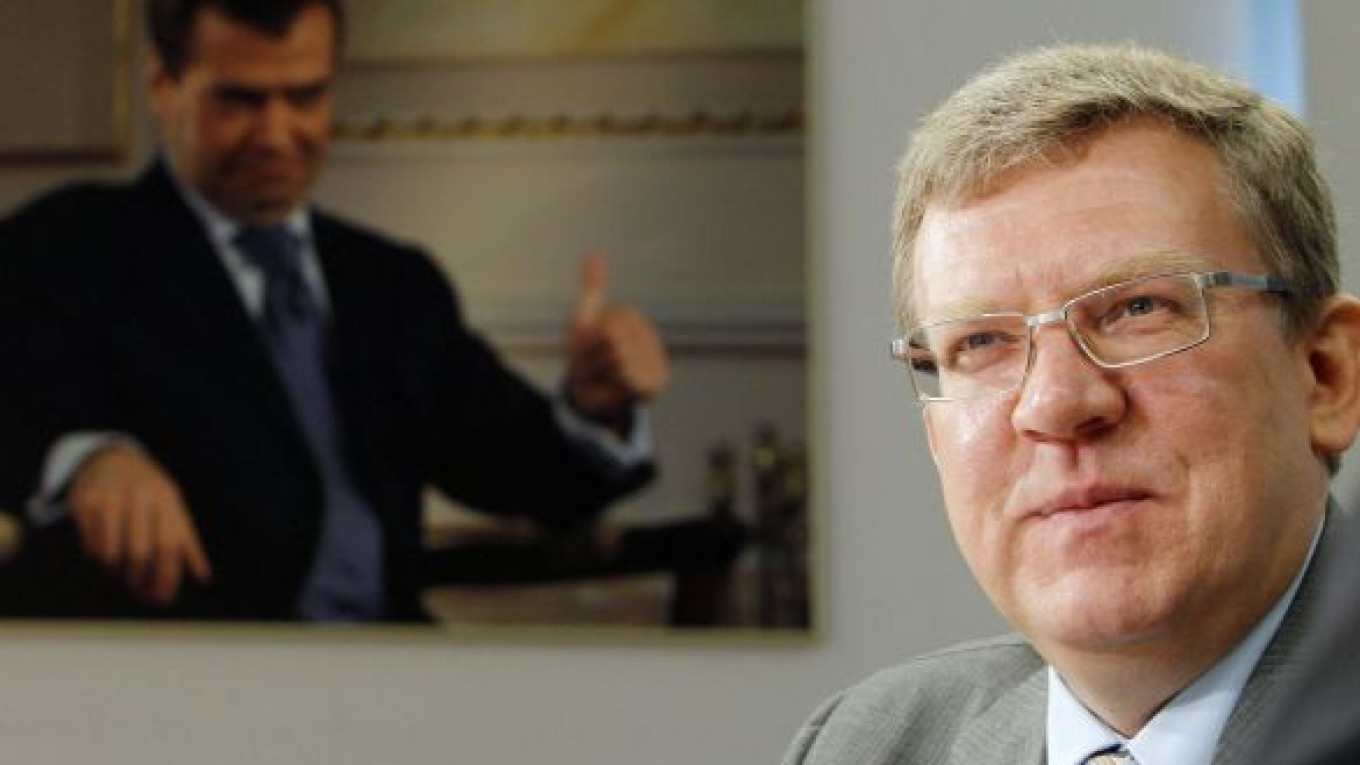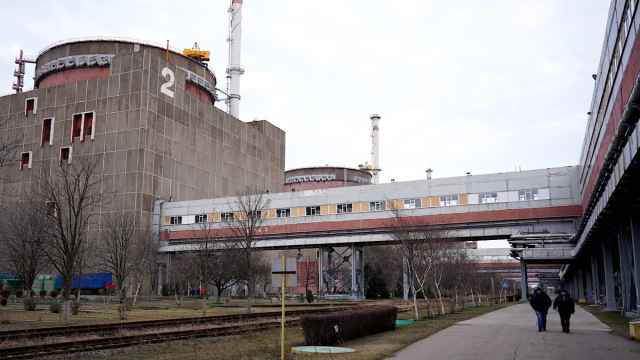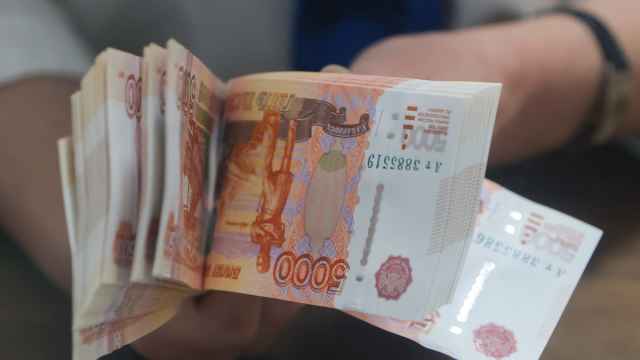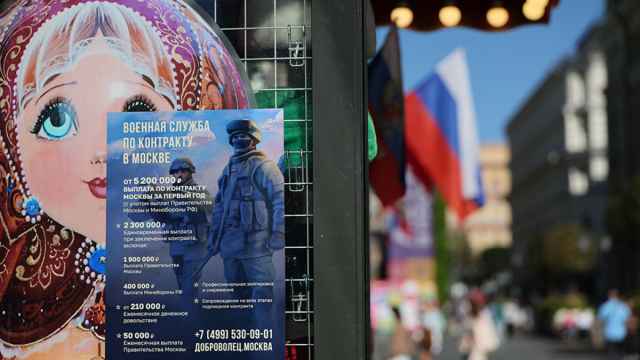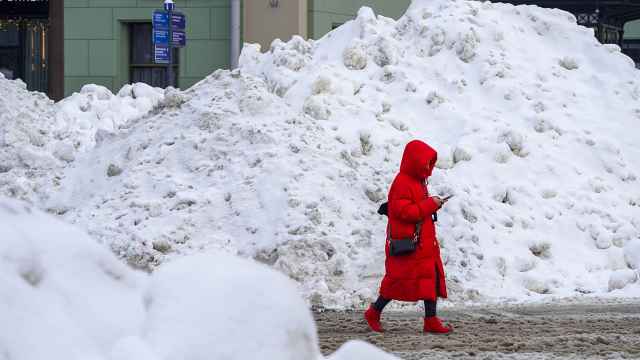Russia's next government will have to raise taxes to make its public finances strong enough to absorb the shock of a possible oil price collapse, Finance Minister Alexei Kudrin said Tuesday.
Kudrin also warned that after parliamentary and presidential elections in the next few months, Russia would have to reform pensions to put them on a sustainable footing and find a way to finance big increases in defense spending.
Speaking at the Reuters Russia Investment Summit, Kudrin said that even after amendments to his fiscal plans, the high oil price at which Russia's budget would balance next year creates "a significant increase in risks."
"For a system like ours, if we can't quickly cut spending, we need to raise taxes — this would increase the stability in the budget system and the economy as a whole," Kudrin said in an interview.
The government this week signed off on a revised fiscal plan that increases the revenue outlook and cuts the projected federal deficit to 1.5 percent of gross domestic product in 2012 from a previous view of 2.7 percent of GDP.
But that budget arithmetic is based on an oil price forecast of $108 per barrel, and the budget would balance only at an elevated level of $116.
Kudrin said higher taxes would not necessarily come at the expense of growth and investment, since Russia's tax burden — net of levies on energy production and exports — is far lower than in most European countries.
Having a broader revenue base would also strengthen Russia's ability to withstand a collapse in oil prices that Kudrin regards as likely over the next few years.
"In the next three or four years the oil price could fall to $60 and stay there for six months," said Kudrin. "For Russia that would be a really difficult scenario."
Kudrin, 50, has served as finance minister since 2000 and has won the respect of investors for saving Russia's oil windfall in a rainy-day fund that will be stocked up to $48 billion by the end of this year.
Despite his long tenure, Kudrin said he had not tired of his work as a reformer and would be willing to serve "in any capacity" under Russia's next president.
Russia holds a parliamentary election in December and will choose a president next March, when either President Dmitry Medvedev or Prime Minister Vladimir Putin is likely to run. Neither has yet declared his candidacy.
Kudrin made clear that pre-election giveaways, in particular an order by Medvedev to cut pension contributions from next year, had been larger than he had hoped.
"The game of pre-election decisions … turned out to be bigger than even I expected, and they often run counter to the midterm and long-term stability of the economy and the budget," he said.
So, even as Russia increases spending by about a third over the next three years, the government will have to cope with a revenue base that will not recover to the levels that preceded the 2008 financial crash and ensuing economic slump.
Kudrin said it would be premature to discuss which taxes Russia should raise, but added that the next government would have two years to decide how best to shore up its revenue base.
The fiscal challenges will thrust reforms to the pension system to the top of the policy agenda after generous increases in old-age pay in 2008 and 2009, widening the deficit in the state pension systems to 2 percent of GDP.
Economists estimate that Russia's poor demographics could lop between 1 percent and 1.5 percent off annual growth as a collapse in the birth rate that followed the breakup of the Soviet Union leads to a sharp fall in the working-age population in the next few years.
Rising life expectancy, meanwhile, is increasing the costs of the pension system that, economists also warn, could undermine the stability of Russia's public finances even though the sovereign debt is now modest at about 10 percent of GDP.
"The pensions system will be the main challenge in our financial system for the next 5-10 years," Kudrin said.
A Message from The Moscow Times:
Dear readers,
We are facing unprecedented challenges. Russia's Prosecutor General's Office has designated The Moscow Times as an "undesirable" organization, criminalizing our work and putting our staff at risk of prosecution. This follows our earlier unjust labeling as a "foreign agent."
These actions are direct attempts to silence independent journalism in Russia. The authorities claim our work "discredits the decisions of the Russian leadership." We see things differently: we strive to provide accurate, unbiased reporting on Russia.
We, the journalists of The Moscow Times, refuse to be silenced. But to continue our work, we need your help.
Your support, no matter how small, makes a world of difference. If you can, please support us monthly starting from just $2. It's quick to set up, and every contribution makes a significant impact.
By supporting The Moscow Times, you're defending open, independent journalism in the face of repression. Thank you for standing with us.
Remind me later.


